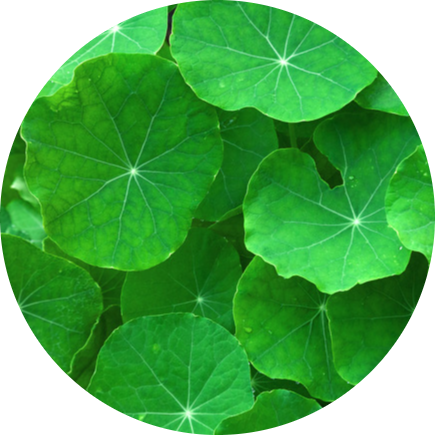- PLANT MEDICINE
- >
- Tinctures
- >
- GOTU KOLA TINCTURE
GOTU KOLA TINCTURE
Family: Apiaceae
Genus: Centella
Species: asiatica
Synonyms: Hydrocotyle asiatica, Brahmi
Common Names: Gotu kola, Indian pennywort, Asiatic pennywort, Mandukaparni
Parts Used: Leaves, stems
Main Actions: Adaptogen, nervine tonic, wound healing, cognitive enhancer
Other Actions: Antioxidant, anti-inflammatory, diuretic
Description: Gotu kola is a perennial herbaceous plant with kidney-shaped leaves, native to Asia and commonly found in moist areas.
Tribal and Herbal Medicine Uses: Used in Ayurvedic, Traditional Chinese, and African traditional medicine for wound healing, improving memory and cognition, and treating skin conditions.
Plant Chemicals: Triterpenoids (asiaticoside, madecassoside), flavonoids, phenolic acids
Biological Activities and Clinical Research: Studies suggest potential benefits in wound healing, cognitive enhancement, and antioxidant effects.
Current Practical Uses: Dietary supplements, herbal teas, topical ointments for wound healing and skin conditions.
Main Preparation Method: Infusion, tincture, topical application
Main Uses: Enhancing memory and cognition, promoting wound healing, reducing inflammation
Properties/Actions Documented by Research: Adaptogenic, antioxidant, wound healing
Other Properties/Actions Documented by Traditional Use: Nervine tonic, diuretic
Cautions: Avoid use during pregnancy and breastfeeding. May cause allergic reactions in some individuals.
Traditional Preparation: Leaves are often brewed into teas or applied topically as poultices.
Contraindications: Not recommended for pregnant or breastfeeding women, individuals with liver disease, or those allergic to the plant.
Drug Interactions: Potential interactions with medications metabolized by the liver. Consult with a healthcare professional before use, especially if taking medications.
Recommended dosage: 1.5 - 3ml taken 3x daily in a small glass of water or juice on an empty stomach for better absorption.

